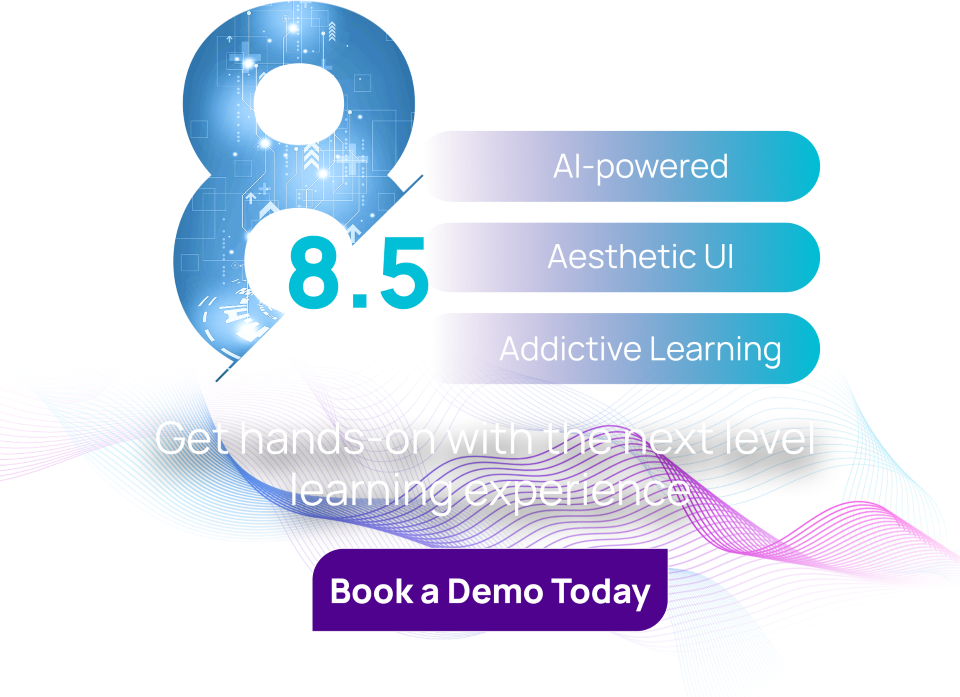
Healthcare LMS: Improving Training in the Medical Field
November 21, 2025
Onboarding with LMS: How a Smart Learning System Reduces Turnover Rates
December 8, 2025Table of contents
- LMS for Onboarding: Simplifying New Hire Training with a Modern Learning Experience
- What Is an LMS for Onboarding?
- Why an LMS Can Make or Break the New Hire Onboarding Experience
- How an Effective LMS for Onboarding Enhances the Experience
- How a Poor LMS or Manual Onboarding Breaks the Experience
- Key Features That Make an LMS for Onboarding Powerful
- Why Organizations Are Moving Toward an LMS for Onboarding
- Conclusion: Building a Meaningful First 90 Days with an Onboarding LMS
- Other Articles
LMS for Onboarding: Simplifying New Hire Training with a Modern Learning Experience
New hire onboarding is one of the most defining phases of an employee’s journey. A strong onboarding process drives confidence, accelerates performance, and improves early engagement.
As organizations scale, hybrid work models expand, and roles become more complex, traditional onboarding methods like manual training, scattered documents, and unstructured shadowing are no longer enough. This is where an LMS for onboarding steps in as a transformational tool.
A modern onboarding LMS centralizes training, automates workflows, and delivers personalized learning paths that help new hires feel confident, supported, and productive from Day 1. This article explains in detail what an LMS for onboarding is, why it matters, and how it reshapes the entire new hire learning experience.
What Is an LMS for Onboarding?
An LMS for onboarding is a specialized employee training software designed to streamline, organize, and enhance the new hire onboarding experience. It acts as a single digital platform where companies can host, manage, track, and deliver all onboarding-related learning materials, from compliance training to job-specific modules and cultural orientation.
An onboarding LMS focuses on the first 30–90 days of an employee’s journey, ensuring they receive structured guidance at each step. An onboarding LMS eliminates manual work, reduces friction for new hires, and offers a consistent, engaging learning experience across locations and roles.
Why an LMS Can Make or Break the New Hire Onboarding Experience
The onboarding phase directly influences how new employees perceive the organization and how quickly they integrate into their roles. A thoughtfully designed LMS for onboarding can significantly elevate this experience, while a poorly executed LMS can lead to confusion and disengagement.
How an Effective LMS for Onboarding Enhances the Experience
- A Smooth&Stress-Free Start
New hires often feel overwhelmed in their first week. Yet a dedicated onboarding LMS provides a clear structure, guiding new hires through learning modules step by step. Everything they need from company policies, introductions, tools training, and job-specific lessons is available in one place.
- Consistent, High-Quality Training
Without a centralized system, new hire onboarding varies drastically between departments and managers. Yet an LMS ensures every employee receives the same high-quality training, no matter where they work or who their supervisor is.
- Faster Time-to-Competency
Role-based learning paths help new employees quickly acquire the skills they need. Microlearning, videos, assessments, and simulations offer a practical and engaging way to ramp up, reducing the time it takes them to become productive.
- Higher Engagement&Retention
Modern learning experiences, including gamification, quizzes, digital badges, and interactive scenarios keep employees motivated and excited about their learning journey. This positive early experience often leads to higher long-term engagement.
- Real-Time Tracking for Managers
With a dedicated onboarding LMS, managers gain visibility into every new hire’s progress. With dashboards and analytics, managers can identify learners who need support, understand their skill gaps, and intervene early to ensure their success.
How a Poor LMS or Manual Onboarding Breaks the Experience
- Confusing or Unstructured Learning Flow
If new hires can’t easily find the right training materials or understand what to complete, onboarding becomes stressful rather than welcoming.
- Outdated, Text-Heavy Content
Oppressive PDFs, lengthy presentations, and boring documents create disengagement. New employees struggle to retain information and often disconnect from the process.
- Delays in Accessing Tools and Training
Manual onboarding relies heavily on HR, IT, and managers to provide resources. This often causes delays that hamper productivity in the initial weeks.
- No Tracking or Feedback Mechanisms
Without analytics, organizations have no insight into whether onboarding is actually effective. This makes it difficult to improve or personalize the onboarding experience for various roles.
Key Features That Make an LMS for Onboarding Powerful
A modern employee training software built specifically for new hire onboarding offers features that simplify, automate, and elevate training.
- Pre-boarding Capabilities: The new hire experience begins before Day 1. With an onboarding LMS, organizations can share:
- Welcome videos
- Company culture and values
- Basic compliance content
- First-week expectations
- Paperwork and digital forms
This reduces anxiety and ensures employees join with confidence.
- Personalized Learning Paths: Every role has unique requirements. Hence, an LMS for onboarding creates personalized paths based on:
- Department
- Job level
- Prior experience
- Skill profiles
New hires therefore receive the right content at the right time, avoiding information overload.
- Interactive & Engaging Training Content: Modern employees expect more than static documents. A strong onboarding LMS includes:
- Microlearning videos
- Interactive scenarios
- Gamified modules
- Quizzes & knowledge checks
- Role-play simulations
- Digital badges & certifications
This learning approach improves retention and sets a positive tone for the workplace.
- Automated Training Workflows: Automation is one of the biggest advantages of using employee training software for new hire onboarding, because it handles:
- Course assignments
- Role-based content mapping
- Reminders & nudges
- Assessment scheduling
- Certificate generation
- Manager notifications
This frees HR teams from manual coordination and ensures zero gaps in training.
- Mobile-First Learning Experience: A mobile-enabled LMS ensures that employees, especially remote or frontline workers, can complete onboarding anytime, anywhere. Short, mobile-friendly modules make learning continuous and convenient.
- Compliance & Policy Training Management: Industries like healthcare, pharma, BFSI, energy, manufacturing, and IT require strict compliance. Thus, an onboarding LMS ensures:
- Mandatory training completion
- Automated verification
- Documented audit trails
- Instant reporting
This reduces risks and ensures all employees meet regulatory standards from Day 1.
- Social Learning & Collaboration Tools: Because new hires often feel disconnected in hybrid environments, an LMS for Onboarding includes social learning features like:
- Discussion forums
- Peer learning groups
- Collaborative activities
- Ask-an-expert spaces
These help employees build relationships early in their journey.
8. Analytics & Performance Insights: Tracking progress is essential to improving new hire onboarding. That’s why LMS dashboards provide:
- Completion rates
- Course engagement
- Assessment scores
- Skill gap insights
- Time spent learning
Managers and HR teams can thus intervene early, support struggling learners, and continuously improve onboarding content.
Why Organizations Are Moving Toward an LMS for Onboarding
Today’s workforce expects clarity, support, and digital-first experiences. Organizations that invest in a robust LMS for onboarding benefit from:
- Reduced first-month attrition
- Faster ramp-up times
- Standardized training across regions
- Better alignment to culture & values
- Stronger early performance
- Higher job satisfaction
Hence, employees join with confidence, managers gain visibility, and HR teams automate repetitive work, all leading to a frictionless onboarding journey.
Conclusion: Building a Meaningful First 90 Days with an Onboarding LMS
The first 90 days shape how employees perceive your organization, your culture, and their future with you. A modern onboarding LMS helps you design these crucial days with compassion and care. A dedicated onboarding LMS brings structure to learning, eliminates manual inefficiencies, and creates a warm, engaging experience that helps new hires feel valued from the very beginning.
With an effective LMS for onboarding, your organization can deliver consistent, personalized, and performance-driven training that turns your new hires into confident contributors, faster and more effectively than traditional methods ever could.
Other Articles




